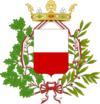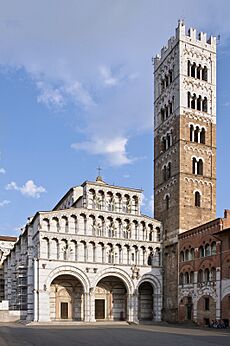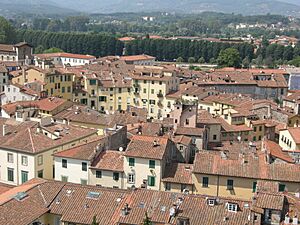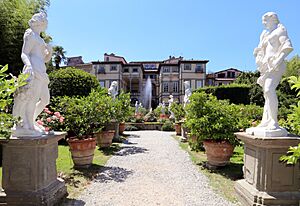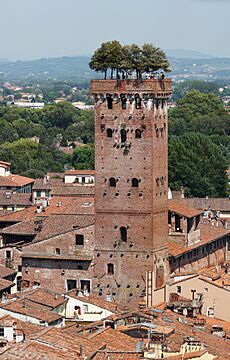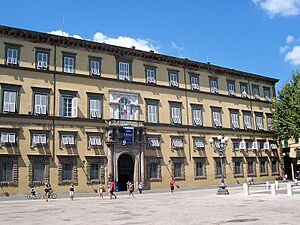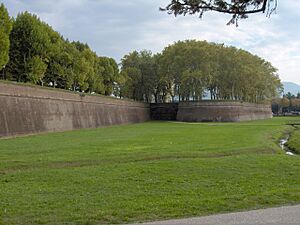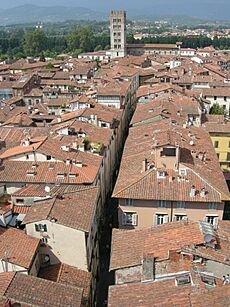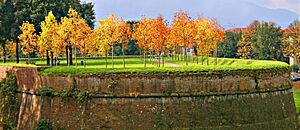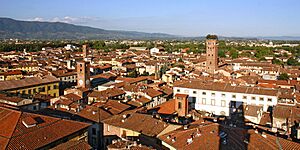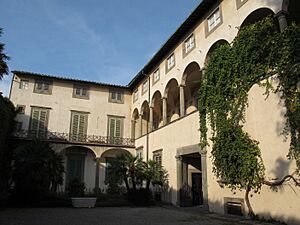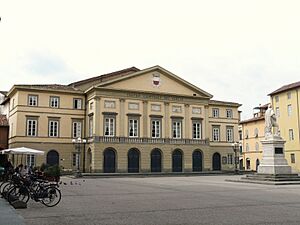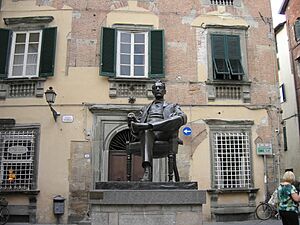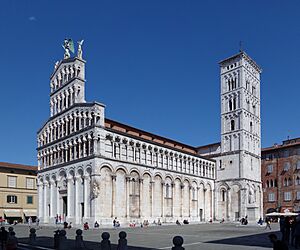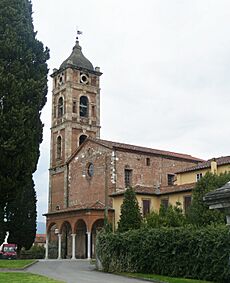Lucca facts for kids
Quick facts for kids
Lucca
|
|||
|---|---|---|---|
| Comune di Lucca | |||
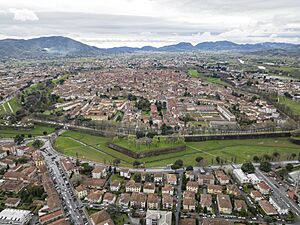
View of Lucca (2022)
|
|||
|
|||
| Country | Italy | ||
| Region | Tuscany | ||
| Province | Lucca (LU) | ||
| Frazioni | see list | ||
| Area | |||
| • Total | 185.5 km2 (71.6 sq mi) | ||
| Elevation | 19 m (62 ft) | ||
| Population
(30 September 2017)
|
|||
| • Total | 89,346 | ||
| • Density | 481.65/km2 (1,247.5/sq mi) | ||
| Demonym(s) | Lucchesi | ||
| Time zone | UTC+1 (CET) | ||
| • Summer (DST) | UTC+2 (CEST) | ||
| Postal code |
55100
|
||
| Dialing code | 0583 | ||
| Patron saint | St. Paulinus | ||
| Saint day | July 12 | ||
Lucca is a beautiful city in Tuscany, Central Italy. It sits on the Serchio River, in a green valley close to the Ligurian Sea. About 89,000 people live in Lucca.
The city is famous for its amazing art and history. It has perfectly preserved Renaissance-era city walls. These walls completely surround the old town. Inside, you'll find a historic center with many old buildings and monuments. Some famous spots include the Piazza dell'Anfiteatro, which is a public square built on an ancient Roman amphitheater. There's also the Guinigi Tower, a tall tower from the 1300s, and the beautiful Cathedral of San Martino.
Lucca is also known as the birthplace of many famous music composers. These include Giacomo Puccini, Alfredo Catalani, and Luigi Boccherini.
Contents
A Look Back: Lucca's History
Lucca has a very long and interesting history. It started as a small settlement and grew into an important city.
Ancient Times
People lived in the Lucca area even before the Etruscans arrived. There are signs of a group called the Ligures from around 300 BC. But the area really became a town when the Romans took over. It became a Roman colony in 180 BC.
You can still see the Roman influence today. The old town's street plan is a perfect rectangle, just like a Roman camp. The Piazza San Michele is where the ancient Roman forum used to be. You can also see the shape of the Roman amphitheatre in the Piazza dell'Anfiteatro.
A very important meeting happened in Lucca in 56 BC. Three powerful Roman leaders, Julius Caesar, Pompey, and Crassus, met here. They confirmed their political team-up, known as the First Triumvirate.
The Middle Ages
In the 6th century, an Irish monk named Frediano became the bishop of Lucca. Lucca was an important city and fortress back then. From 576 to 797, it was the capital of a large area called the Duchy of Tuscia under the Lombards. During this time, Lucca even made its own coins.
A very special religious item, the Holy Face of Lucca (or Volto Santo), arrived in 742. Many people believed it was carved by Nicodemus himself. This made Lucca a major stop on the Via Francigena. This was a main pilgrimage route for people traveling to Rome from the north.
Lucca became very rich thanks to the silk trade. This trade started in the 11th century. Lucca's silks became so famous they even competed with silks from the Byzantine Empire. For a while, Lucca was the capital of Tuscany.
An Independent Republic
After 1160, Lucca became an independent city-state. It stayed independent for almost 500 years! This was quite rare for cities in Italy. Lucca was a democracy at first, then later an oligarchy (ruled by a small group). It kept its freedom, like Venice and Genoa, until the French Revolution in 1789.
The famous poet Dante even spent some of his time in exile in Lucca. In 1314, a leader from Pisa, Uguccione della Faggiuola, took control of Lucca. But the people of Lucca kicked him out two years later. They then chose a new leader, Castruccio Castracani. Under his rule, Lucca became a very strong state in central Italy. Castracani even defeated Florence in a battle in 1325.
Modern Times
Between 1799 and 1800, French and Austrian armies fought over Lucca. The French won and gave Lucca a democratic government in 1801. But in 1805, Napoleon changed Lucca into a monarchy. He made his sister, Elisa Bonaparte Baciocchi, the "Princess of Lucca."
From 1815 to 1847, Lucca was a duchy ruled by the Bourbon-Parma family. In 1847, Lucca lost its independence and became part of the Grand Duchy of Tuscany. Finally, in 1861, Lucca became part of the new Italian State.
World War II History
During World War II, a camp for prisoners of war was set up near Lucca in 1942. It was called PG 60 Lucca. The camp had tents for housing and could hold over 3,000 British and Commonwealth soldiers. In 1943, the camp was taken over by the Germans. Later, it was used to hold political prisoners, foreigners, and others. In 1944, the prisoners were moved to another location.
People and Population
| Historical population | |||||||||||||||||||||||||||||||||||||||||||||||||||||||
|---|---|---|---|---|---|---|---|---|---|---|---|---|---|---|---|---|---|---|---|---|---|---|---|---|---|---|---|---|---|---|---|---|---|---|---|---|---|---|---|---|---|---|---|---|---|---|---|---|---|---|---|---|---|---|---|
|
|
||||||||||||||||||||||||||||||||||||||||||||||||||||||
| Source: ISTAT | |||||||||||||||||||||||||||||||||||||||||||||||||||||||
Culture and Arts
Lucca is a city rich in culture. It is the birthplace of many famous composers. These include Giacomo Puccini, who wrote famous operas like La Bohème and Madama Butterfly. Other composers from Lucca are Francesco Geminiani, Luigi Boccherini, and Alfredo Catalani.
Since 2004, Lucca has been home to IMT Lucca. This is a special public research and graduate school. It is part of Italy's top graduate school system.
Exciting Events
Lucca hosts many fun events throughout the year:
- Lucca Summer Festival: An annual music festival with live performances by famous artists.
- Lucca Comics and Games: Europe's largest festival for comics, movies, games, and related topics. It's a huge event for fans!
- Procession of Santa Croce: A traditional costume parade through the city on September 13th.
- Lucca Film Festival: A festival celebrating movies.
- Lucca Biennale Cartasia: An international art show that focuses only on Paper Art.
Lucca in Film and TV
Lucca's beautiful scenery has been featured in movies and TV shows.
- The 1958 film Giovani mariti was filmed in Lucca.
- The 1993 miniseries Private Crimes was also set and filmed here.
- Top Gear filmed an episode of its 17th season in Lucca.
Unique Architecture
Lucca is also known for its marble. After a fire in the early 1900s, a part of the Legislative Assembly of Ontario in Canada was rebuilt using marble from Lucca. The beautiful floor mosaic there is made entirely of this Italian marble.
Main Sights to See
Walls, Streets, and Squares
The most famous feature of Lucca is its amazing city walls. These walls completely surround the old town and are still perfectly intact! This is very rare for cities in this area. The walls were first built for defense. But now, they are a popular walking path called the Passeggiata delle Mure Urbane. You can walk or bike all the way around the city on top of them.
The walled city has many public squares. The most famous is the Piazza dell'Anfiteatro, which is built on the site of an ancient Roman amphitheater. Other important squares include Piazzale Verdi and Piazza Napoleone.
Palaces, Villas, and Towers
- Ducal Palace: This grand palace was built where Castruccio Castracani's fortress once stood.
- Pfanner Palace: A beautiful palace with lovely gardens.
- Torre delle Ore: Also known as "The Clock Tower."
- Guinigi Tower and House: You can climb this tower for amazing views. It has oak trees growing on its top balcony!
- Casa di Puccini: The house of the famous opera composer, Giacomo Puccini.
- Orto Botanico Comunale di Lucca: A botanical garden that started in 1820.
- Teatro del Giglio: A 19th-century opera house.
Historic Churches
Lucca has many old churches, some dating back to the 8th century. They often have beautiful arched fronts and bell towers.
- Duomo di San Martino: St Martin's Cathedral, a major church in the city.
- San Michele in Foro: A Romanesque church in the city's main square.
- Basilica di San Frediano: Another important basilica.
- Sant'Alessandro: A great example of medieval classicism.
Museums to Explore
- Museo della Cattedrale: The Cathedral Museum.
- Orto Botanico Comunale di Lucca: The city's botanical garden.
Education and Learning
Since 2005, Lucca has been home to the IMT School for Advanced Studies Lucca. This is a special graduate and doctoral school. It is part of Italy's top system for higher education. Its main buildings are in the San Francesco Convent Complex. The old San Ponziano church now holds the university library.
Sports in Lucca
Association football (soccer) came to Lucca in 1905. The local team, Lucchese 1905, plays in Serie C, which is the third level of Italian football. They play their home games at Stadio Porta Elisa, just outside the city walls.
Getting Around
Public transport in Lucca is managed by Autolinee Toscane since 2021. They operate the local bus services.
Famous People from Lucca
- Anselm of Lucca (1036–1086), a bishop of Lucca.
- Luigi Boccherini (1743–1805), a famous musician and composer.
- Elisa Bonaparte (1777–1820), Napoleon's sister, who ruled Lucca for a time.
- Castruccio Castracani (1316–1328), a powerful ruler of Lucca.
- Alfredo Catalani (1854–1893), another well-known composer.
- Francesco Geminiani (1687–1762), a musician and composer.
- Pope Lucius III (1097–1185), who became Pope.
- Giacomo Puccini (1858–1924), one of the most famous opera composers ever.
- Saint Zita (c.1212–1272), a beloved saint.
Sister Cities
Lucca has "sister city" relationships with several other cities around the world. This helps promote cultural exchange and friendship.
 Abingdon, England, United Kingdom
Abingdon, England, United Kingdom Colmar, France
Colmar, France Gorinchem, The Netherlands
Gorinchem, The Netherlands Hämeenlinna, Finland
Hämeenlinna, Finland Schongau, Germany
Schongau, Germany Sint-Niklaas, Belgium
Sint-Niklaas, Belgium South San Francisco, United States
South San Francisco, United States
Images for kids
See also
 In Spanish: Lucca para niños
In Spanish: Lucca para niños
 | Valerie Thomas |
 | Frederick McKinley Jones |
 | George Edward Alcorn Jr. |
 | Thomas Mensah |



